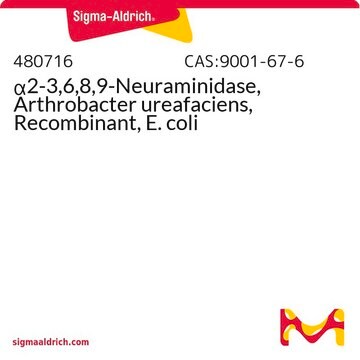N5521
α(2→3,6) Neuraminidase from Clostridium perfringens (C. welchii)
recombinant, expressed in E. coli, buffered aqueous solution, ≥250 units/mg protein
Synonym(s):
Acyl-Neuraminyl Hydrolase, Sialidase
About This Item
Recommended Products
recombinant
expressed in E. coli
Quality Level
form
buffered aqueous solution
specific activity
≥250 units/mg protein
mol wt
~41 kDa
foreign activity
proteases, none detected
shipped in
wet ice
storage temp.
2-8°C
Looking for similar products? Visit Product Comparison Guide
Biochem/physiol Actions
Packaging
Unit Definition
Physical form
Preparation Note
Signal Word
Danger
Hazard Statements
Precautionary Statements
Hazard Classifications
Resp. Sens. 1
Storage Class Code
12 - Non Combustible Liquids
WGK
WGK 1
Flash Point(F)
Not applicable
Flash Point(C)
Not applicable
Personal Protective Equipment
Certificates of Analysis (COA)
Search for Certificates of Analysis (COA) by entering the products Lot/Batch Number. Lot and Batch Numbers can be found on a product’s label following the words ‘Lot’ or ‘Batch’.
Already Own This Product?
Find documentation for the products that you have recently purchased in the Document Library.
Customers Also Viewed
Articles
Understand sialic acid structure, function, signaling, and modifications. Easily find products for sialic acid research.
Our team of scientists has experience in all areas of research including Life Science, Material Science, Chemical Synthesis, Chromatography, Analytical and many others.
Contact Technical Service





